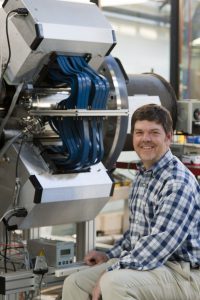
William was one of the original members of DES participating in discussions back in 2003 on whether we should use facilities for building particle physics silicon detectors for building the Dark Energy Camera (DECam). He is now active in the supernova cosmology science working group and the calibrations working group. Calibrating a detector is something his background in particle physics has taught him … and it is important in the supernova science.
William’s work is also laying the foundation for new techniques to find more supernovae or to find new evidence of dark matter. These techniques also help to look for moving objects like a possible Planet Nine! If DES could be so fortunate to make such a discovery, a new planet would surely capture the world’s interest.
We asked William a few more questions — here’s what he had to say:
What is your favorite part about being a scientist?
When did you know you wanted to be a scientist?
When I was seven years old, I spoke to a college professor in science who made “an eclipse kit” for me to observe a partial solar eclipse. I started reading books and was hooked especially since I also liked math.
In college, I made an important decision one day … not to take the medical school application test; but rather to go to physics graduate school after I enjoyed working a couple summers in an undergraduate research program in particle physics.
Do you have any hobbies or play any sports?
I’ve always enjoyed sports, but was more of a mathlete than athlete. To participate, I became a baseball umpire which I practiced for more than 20 years. I’ve umpired games featuring some now famous players (Ken Griffey Jr., being the most famous).
For the last 10 years, I’ve taken up golf and have continued to try to improve each year. My handicap is around 13 which is fairly respectable and means I usually shoot in the 80’s.
Do you have kids? Do they want to be scientists too?
What do you think has been the most exciting advance in physics / astronomy in the last 10 years?
Any advice for aspiring scientists?
My thesis advisor gave me the advice to work on “what would make you happy.” Some spend too much time worrying about other factors like what would be the best thing to work on for a next step in one’s career.
If you work on what makes you happy, you’ll work hard on it, be passionate about it, and do a good job on it. That usually will pay off more than picking something for other reasons.